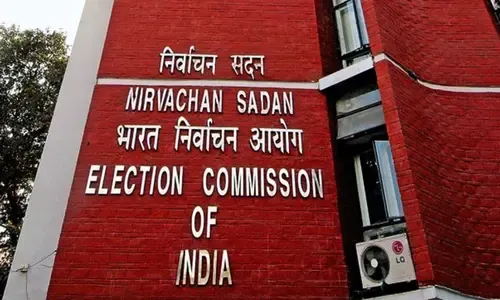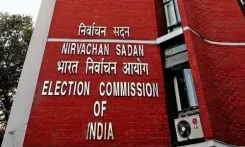What Are the Implications of NDA's Protests Against Islamic Cleric's Remarks on Dimple Yadav?

Synopsis
Key Takeaways
- NDA MPs condemned derogatory remarks by Maulana Sajid Rashidi.
- Protest focused on women's dignity and social issues.
- FIR filed against Rashidi for his inflammatory comments.
- Opposition protests against the Election Commission's SIR process.
- Concerns about potential voter disenfranchisement.
New Delhi, July 28 (NationPress) The National Democratic Alliance (NDA) Members of Parliament (MPs) organized a protest within the confines of Parliament on Monday, vehemently denouncing the derogatory comments made by Islamic cleric Maulana Sajid Rashidi about Samajwadi Party (SP) MP Dimple Yadav.
The MPs demonstrated solidarity outside Parliament, brandishing placards that proclaimed, "Nari garima par prahar, nahi karenge kabhi bhi sweekar" (We will never accept any assault on women's dignity).
This protest follows an FIR filed by the Lucknow Police against Maulana Sajid Rashidi for allegedly making inflammatory, objectionable, and misogynistic statements concerning the Mainpuri MP during a televised discussion.
In his contentious remarks, Rashidi criticized Dimple Yadav for her public appearance without a head covering, leading to widespread condemnation from various political factions and citizens alike.
These remarks reportedly stemmed from footage of a Samajwadi Party gathering held at the Sansad Marg mosque in Delhi, attended by Dimple Yadav, SP leader Akhilesh Yadav, and Kairana MP Iqra Hasan.
The cleric's comments have faced severe backlash for being anti-women and socially divisive. An FIR has been lodged against him, and a police investigation is ongoing.
While the NDA demanded action regarding this matter, the INDIA bloc persisted in its own protest outside Parliament, targeting the Election Commission's Special Intensive Revision (SIR) initiative in Bihar.
Prominent leaders, including SP chief and Dimple Yadav's spouse Akhilesh Yadav, assembled at Makar Dwar in Parliament, chanting slogans and demanding an immediate cessation of the revision process.
The SIR has ignited political controversy following reports that over 52 lakh names might be purged from the voter rolls due to duplication, relocation, or death.
Opposition parties argue that this exercise is aimed at marginalizing certain communities, dubbing it a form of "institutional voter cleansing" intended to favor the ruling NDA.
In contrast, the Election Commission has defended the process, asserting that the revision is standard, transparent, and follows established protocols, denying all claims of political bias.










